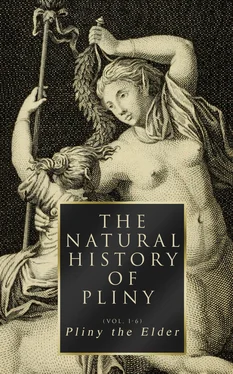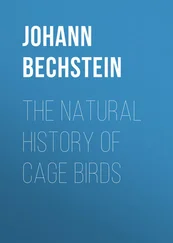That I may not, however, appear to inveigh so completely against the Greeks, I should wish to be considered under the same point of view with those inventors of the arts of painting and sculpture, of whom you will find an account in these volumes, whose works, although they are so perfect that we are never satisfied with admiring them, are inscribed with a temporary title 69, such as “Apelles, or Polycletus, was doing this;” implying that the work was only commenced and still imperfect, and that the artist might benefit by the criticisms that were made on it and alter any part that required it, if he had not been prevented by death. It is also a great mark of their modesty, that they inscribed their works as if they were the last which they had executed, and as still in hand at the time of their death. I think there are but three works of art which are inscribed positively with the words “such a one executed this;” of these I shall give an account in the proper place. In these cases it appears, that the artist felt the most perfect satisfaction with his work, and hence these pieces have excited the envy of every one.
I, indeed, freely admit, that much may be added to my works; not only to this, but to all which I have published. By this admission I hope to escape from the carping critics 70, and I have the more reason to say this, because I hear that there are certain Stoics and Logicians 71, and also Epicureans (from the Grammarians 72I expected as much), who are big with something against the little work I published on Grammar 73; and that they have been carrying these abortions for ten years together—a longer pregnancy this than the elephant’s 74. But I well know, that even a woman once wrote against Theophrastus, a man so eminent for his eloquence that he obtained his name, which signifies the Divine speaker 75, and that from this circumstance originated the proverb of choosing a tree to hang oneself 76.
I cannot refrain from quoting the words of Cato the censor, which are so pertinent to this point. It appears from them, that even Cato, who wrote commentaries on military discipline 77, and who had learned the military art under Africanus, or rather under Hannibal (for he could not endure Africanus 78, who, when he was his general, had borne away the triumph from him), that Cato, I say, was open to the attacks of such as caught at reputation for themselves by detracting from the merits of others. And what does he say in his book? “I know, that when I shall publish what I have written, there will be many who will do all they can to depreciate it, and, especially, such as are themselves void of all merit; but I let their harangues glide by me.” Nor was the remark of Plancus 79a bad one, when Asinius Pollio 80was said to be preparing an oration against him, which was to be published either by himself or his children, after the death of Plancus, in order that he might not be able to answer it: “It is only ghosts that fight with the dead.” This gave such a blow to the oration, that in the opinion of the learned generally, nothing was ever thought more scandalous. Feeling myself, therefore, secure against these vile slanderers 81, a name elegantly composed by Cato, to express their slanderous and vile disposition (for what other object have they, but to wrangle and breed quarrels?), I will proceed with my projected work.
And because the public good requires that you should be spared as much as possible from all trouble, I have subjoined to this epistle the contents of each of the following books 82, and have used my best endeavours to prevent your being obliged to read them all through. And this, which was done for your benefit, will also serve the same purpose for others, so that any one may search for what he wishes, and may know where to find it. This has been already done among us by Valerius Soranus, in his work which he entitled “On Mysteries 83.”
The 1st book is the Preface of the Work, dedicated to Titus Vespasian Cæsar.
The 2nd is on the World, the Elements, and the Heavenly Bodies 84.
The 3rd, 4th, 5th and 6th books are on Geography, in which is contained an account of the situation of the different countries, the inhabitants, the seas, towns, harbours, mountains, rivers, and dimensions, and the various tribes, some of which still exist and others have disappeared.
The 7th is on Man, and the Inventions of Man.
The 8th on the various kinds of Land Animals.
The 9th on Aquatic Animals.
The 10th on the various kinds of Birds.
The 11th on Insects.
The 12th on Odoriferous Plants.
The 13th on Exotic Trees.
The 14th on Vines.
The 15th on Fruit Trees.
The 16th on Forest Trees.
The 17th on Plants raised in nurseries or gardens.
The 18th on the nature of Fruits and the Cerealia, and the pursuits of the Husbandman.
The 19th on Flax, Broom 85, and Gardening.
The 20th on the Cultivated Plants that are proper for food and for medicine.
The 21st on Flowers and Plants that are used for making Garlands.
The 22nd on Garlands, and Medicines made from Plants.
The 23rd on Medicines made from Wine and from cultivated Trees.
The 24th on Medicines made from Forest Trees.
The 25th on Medicines made from Wild Plants.
The 26th on New Diseases, and Medicines made, for certain Diseases, from Plants.
The 27th on some other Plants and Medicines.
The 28th on Medicines procured from Man and from large Animals.
The 29th on Medical Authors, and on Medicines from other Animals.
The 30th on Magic, and Medicines for certain parts of the Body.
The 31st on Medicines from Aquatic Animals.
The 32nd on the other properties of Aquatic Animals.
The 33rd on Gold and Silver.
The 34th on Copper and Lead, and the workers of Copper.
The 35th on Painting, Colours, and Painters.
The 36th on Marbles and Stones.
The 37th on Gems.
Table of Contents
AN ACCOUNT OF THE WORLD AND THE ELEMENTS.
[I have adopted the division of the chapters from Hardouin, as given in the editions of Valpy, Lemaire, Ajasson, and Sillig; the Roman figures, enclosed between brackets, are the numbers of the chapters in Dalechamps, De Laët, Gronovius, Holland, and Poinsinet. The titles of the chapters are nearly the same with those in Valpy, Lemaire, and Ajasson.]
CHAP. 1. (1.)—WHETHER THE WORLD BE FINITE, AND WHETHER THERE BE MORE THAN ONE WORLD.
Table of Contents
The world 86, and whatever that be which we otherwise call the heavens 87, by the vault of which all things are enclosed, we must conceive to be a Deity 88, to be eternal, without bounds, neither created, nor subject, at any time, to destruction 89. To inquire what is beyond it is no concern of man, nor can the human mind form any conjecture respecting it. It is sacred, eternal, and without bounds, all in all; indeed including everything in itself; finite, yet like what is infinite; the most certain of all things, yet like what is uncertain, externally and internally embracing all things in itself; it is the work of nature, and itself constitutes nature 90.
It is madness to harass the mind, as some have done, with attempts to measure the world, and to publish these attempts; or, like others, to argue from what they have made out, that there are innumerable other worlds, and that we must believe there to be so many other natures, or that, if only one nature produced the whole, there will be so many suns and so many moons, and that each of them will have immense trains of other heavenly bodies. As if the same question would not recur at every step of our inquiry, anxious as we must be to arrive at some termination; or, as if this infinity, which we ascribe to nature, the former of all things, cannot be more easily comprehended by one single formation, especially when that is so extensive. It is madness, perfect madness, to go out of this world and to search for what is beyond it, as if one who is ignorant of his own dimensions could ascertain the measure of any thing else, or as if the human mind could see what the world itself cannot contain.
Читать дальше












